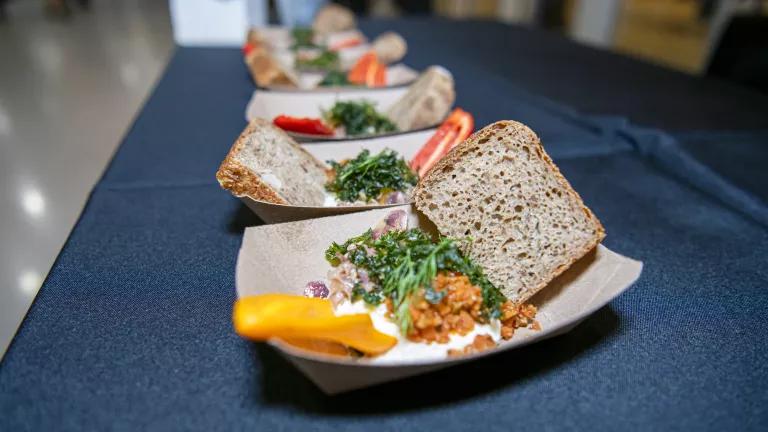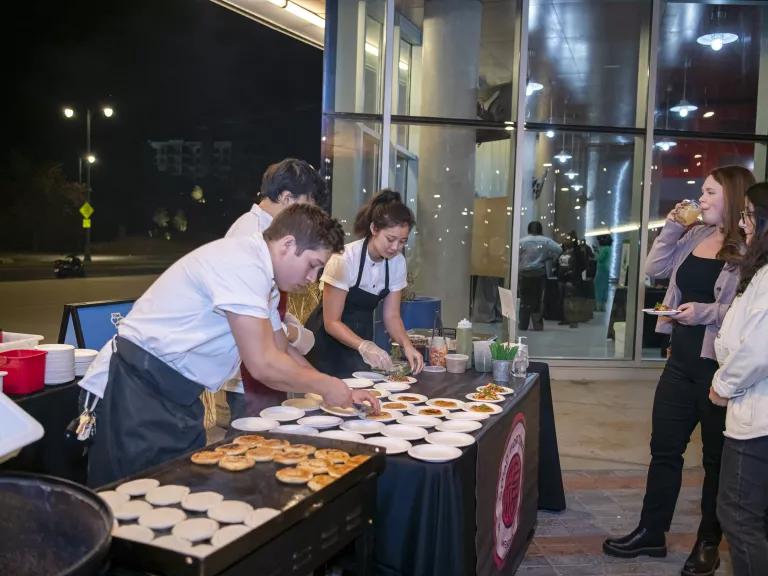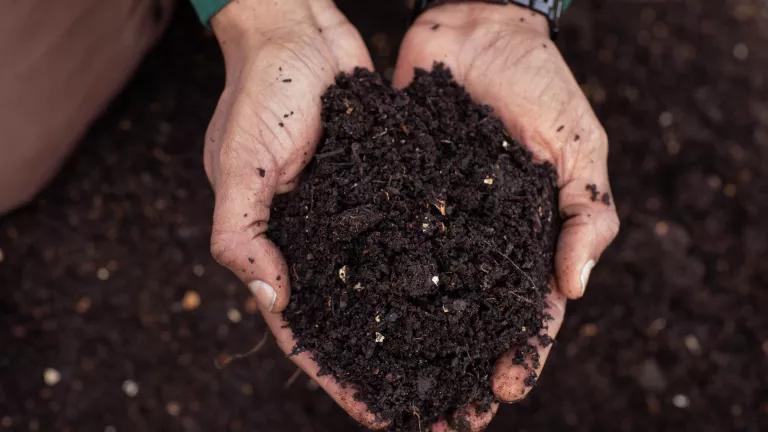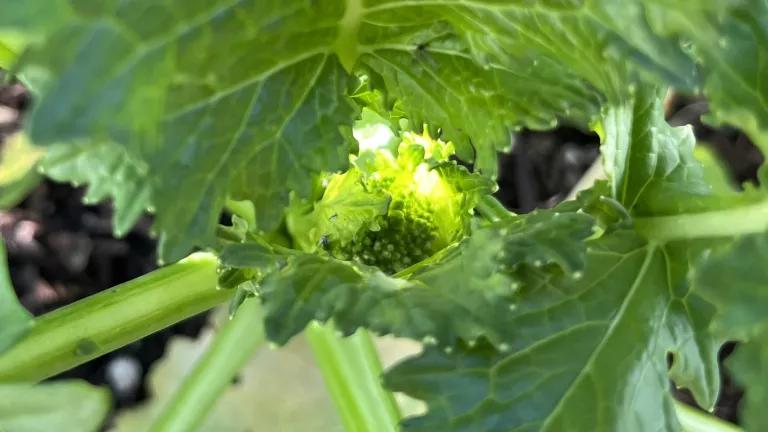Food Matters: Year-in-Review
Through NRDC's Food Matters initiative, U.S. cities work to prevent food from becoming waste, rescue surplus food, and recycle food scraps.

Hors d’oeuvres from the Reharvest Memphis event using surplus ingredients from grocery stores
Ashley Weaver for Clean Memphis
The past year has marked significant progress for the NRDC Food Waste team and nationwide efforts to combat food waste. A substantial portion of food waste is generated in cities, including in homes, restaurants, and groceries. Local governments are uniquely incentivized to address this issue, as reducing food waste can cut municipal solid waste costs, increase food availability for residents, and contribute to ambitious climate goals.
Since 2017, NRDC has been helping to reduce city food waste through our Food Matters initiative. In January 2023, following the successful conclusion of our Southeast and Mid-Atlantic cohorts in 2022, we expanded our technical support offerings to additional cities around the country. We are now actively supporting 21 city and nonprofit partners, both new and ongoing, in implementing a variety of solutions.
Currently, we are working with each partner to focus on one strategy at a time, allowing us to dedicate resources to ensure successful implementation before moving on to additional strategies. We have active partnerships with Albuquerque, Boston, Denver, Lane County (OR), Los Angeles, Clean Memphis, Minneapolis, Nashville, Phoenix, Pittsburgh, Portland (OR), an Joint Venture (Santa Clara County, CA), Earthday365 (St. Louis), Sustainable Business Network of Greater Philadelphia, and Washington DC.
We also continue to strengthen existing partnerships with cities from our Great Lakes cohort, with a particular focus on setting the stage for long-term strategic planning and policy development. By aligning food waste reduction strategic plans with existing city goals in climate action, food, and waste, we hope to gain the support needed from elected officials and agency leaders to drive deeper progress.
Across the cities where we have partnerships, we have observed increased buy-in, funding, and staffing for our partners and their projects. These developments position us well to effectively advance long-term priorities in the coming years.
Some highlights from several Food Matters partner cities over the past year include:
- Albuquerque: After completing waste audits at five food service providers and starting a food waste composting pilot, the City of Albuquerque is expanding the pilot to include food waste prevention at two sites: a city-run commercial-scale kitchen and a concessions site run by Three Sisters Kitchen. As part of this next phase, the city is working with Three Sisters Kitchen on a project to connect kitchens with other kitchens and to provide resources in both English and Spanish for kitchen staff, including recipes that showcase how to make use of the most commonly wasted items found in the audits, a local food donation quick-reference guide for kitchens, a toolkit on requesting to-go containers, and educational programming on the importance of food waste prevention.
- Chicago: The City of Chicago recently launched a food scrap drop-off program at 15 locations citywide with the food scraps being processed at a composting facility within the city limits. This is one of a number of new composting options the city is offering its residents. Additionally, the city also spearheaded a pilot program that rescued over 5,600 pounds of fresh produce for community redistribution and composted nearly 1,000 pounds of non-edible organics at two Farmers Markets: Daley Plaza and Bronzeville. This initiative was in partnership with Urban Canopy and Bright Beat and made possible with support from Food Matters. Due to its success, this pilot project is being reviewed as a viable model for further expansion across additional Chicago farmers markets in the future.
- Cincinnati and Hamilton County ReSource: The City of Cincinnati’s updated 2023 Green Cincinnati Plan (GCP) adopted by the city council in April. The GCP is the sustainability plan for the city and community and presents a comprehensive set of recommendations to advance the sustainability, equity, and resilience of the city. The plan includes goals to divert 50% of organics (including yard and food waste) from disposal by 2028, implement five of the Milan Urban Food Policy Pact (MUFPP) recommendations by 2028, and decrease food going to the landfill 50% by 2030. Hamilton County ReSource completed a five-year update to their solid waste plan, mirroring the EPA’s goal to reduce food waste by 50% by 2030. The plan was ratified by 99% of the communities in Hamilton County and was approved by Ohio EPA in November. This cooperative goalsetting highlights the importance of the ongoing partnership between the City of Cincinnati and Hamilton County to bolster initiatives and support the needs of area residents.
- Columbus and SWACO: In partnership with SWACO, the City of Columbus, and Franklin County, our team gave eight grants to local community-based organizations working across Franklin County on food waste reduction projects. Projects ranged from supporting food rescue organizations in collecting and redistributing more surplus food, providing composting and food waste reduction education in households, and supporting backyard compost education. The grant program was developed using NRDC’s case study on equitable food waste reduction capacity grants.
- Detroit: With support from NRDC, Make Food Not Waste, a Detroit-based food waste organization, conducted interviews and used data Food Rescue US Detroit client survey to draft a food rescue opportunity report. The report outlines key findings such as the need for improved education on food safety guidelines and liability protection, the importance of coordination among multiple food rescue organizations and pantries, and the value of involving residents in the leadership charitable food system. The report also notes challenges like inconsistent staffing and fluctuations in donated food volumes and lacking data and measurement practices among food waste generators and pantries. Also in Detroit, local organization FoodPLUS Detroit worked alongside three farmers market teams to pilot mobile food scrap drop-off sites in three Detroit neighborhoods. One of the teams included three youths who designed a site, participated in compost training, and educated them about food scrap collection and composting. The youth received work stipends and training scholarships to support their engagement.
- Madison: In partnership with local organizations, Rooted and Sustain Dane, and with support from NRDC, the City was able to offer composting options at 2 farmers markets and 3 community gardens. The farmers markets were available for residents to drop food scraps through the summer and fall. At the community gardens, residents can sign up to participate at these garden sites.
- Memphis: Clean Memphis, our nonprofit partner in Memphis, recently ran a restaurant challenge in which participating restaurants selected and implemented food waste reduction strategies over a one-month period. Strategies included prevention tactics, surplus food donation, and/or composting. Clean Memphis is continuing the challenge with a new neighborhood and a new set of restaurants. Also, on November 16, Clean Memphis hosted its annual Reharvest Memphis event, featuring local chefs who prepared hors d’oeuvres using surplus ingredients from grocery stores. The chefs also shared their sustainability practices for both their professional and personal kitchens. The event diverted more than 90% of waste from the landfill, including donating over 40 pounds of food. On December 18, Clean Memphis is announcing their latest mini-grant award recipients. These small grants, awarded to organizations working directly with people experiencing food insecurity, are intended to build capacity within their operations. Past recipients have purchased shelving, refrigeration, and even supplies for accessible garden beds to support and enhance their work.

Chefs serving surplus food that would have gone to waste at Clean Memphis's Reharvest Memphis event
Ashley Weaver
- Minneapolis: The City of Minneapolis is developing a series of videos for restaurants on how to prevent wasted food. The videos focus on four key areas: why to prevent wasted food, how to prevent wasted food, food donations to people, and composting. The goal of the videos is to engage Minneapolis restaurants and other food facilities to reduce food waste citywide.
- Nashville: The City of Nashville recently passed a resolution supporting municipal leadership on food waste reduction and encouraging a metropolitan government and community-wide target of a 50% reduction in food waste from 2017 levels by 2030, in line with the federal goal for food waste reduction. In support of Nashville's goal, NRDC worked with the Nashville Metro government to help them launch a year-long food scrap curbside collection pilot program for households; participants can put collected food scraps and other organic materials at the curb once a week to be picked up and taken to a composting facility.
- Philadelphia: The Sustainable Business Council of Greater Philadelphia (SBN) launched their Food Saver Challenge in September. Through the challenge SBN is working with nine local food businesses and several food waste reduction organizations to reduce, redistribute, and compost excess food. Each participating business can receive points based on eligible food waste reduction actions, and the business with the most points at the end of the challenge will win a cash prize.
- Phoenix: In June, the City of Phoenix conducted waste audits for restaurants participating in their restaurant challenge. Waste from each of the nine participating restaurants was collected and sorted to identify which food items might have been prevented from ending up as waste and to highlight opportunities for food scrap recycling. The challenge ran for ten weeks and will be capped by a chef challenge in January featuring chefs from three participant restaurants.
- Pittsburgh: The city partnered with local group Pennsylvania Resources Council to test at-home solutions to managing food waste in 300 households by using a variety of different food scrap recycling methods (worm bins, bokashi, backyard composting). During the pilot, participants were asked to fill out surveys about the challenges and how the systems changed their household food waste habits.
- St. Louis: In October, eight restaurants from the region participated in the monthlong STL Food Waste Challenge, led by earthday365 (NRDC partner) as part of their Green Dining Alliance program. Participating businesses committed to implementing waste prevention measures, donating surplus food, and/or composting kitchen scraps. On November 17, members of the public attended a standing room only celebration honoring all participants, with Mayor Tishaura Jones declaring November 17 as “Food Waste Awareness Day” in St. Louis City.

Staff from earthday365 in St. Louis pose with the City of St. Louis Mayor's office proclamation of Food Waste Awareness Day.
Kelly Lu, Communications & Marketing Coordinator for earthday365
- Washington DC: DC is continuing to encourage District residents to prevent food from going to waste in their homes. The Department of Energy and Environment recently ran Save the Food ads in several local publications, including ads in English and Spanish. In total, the English ads were in print in 135,000 publications, e-blasted 25,000 times and had 346,762 web views. One Spanish ad had 625,000 impressions while another newsletter had 24,740 total opens.
Knowledge sharing network
Sharing lessons learned, challenges, and advice between NRDC and Food Matters partners is foundational to the success of Food Matters. This year we formalized a structure for our peer learning network and have over 30 cities/counties represented. Building on lessons learned through our regional cohorts, our previous learning group, and multiple convenings, we created a structure for our network that offers several different ways for people to engage. Our Food Matters network features a SharePoint website for document sharing, a periodic newsletter to disseminate resources and events, themed network calls to highlight experts in different topics, and open office hours for informal conversations.
In the past year, our network calls and office hours covered topics including model policies, federal grants, and business engagement. We also continue to connect in-person where feasible, and this year we led a study tour to the City of Milan in partnership with MUFPP, C40, and Bloomberg Associates. After the tour, NRDC conducted a workshop for the Food Matters network on how to use MUFPP’s template for cities to create Food Waste Action Plans. Throughout the year, we solicited feedback on our various network offerings, the bulk of which was positive. We also saw many network members connect with each other outside of formal meetings.
In the next year, we look forward to fine-tuning the network structure, delving deeper into topics such as equity, funding, and collaboration. The network is open to municipalities and nonprofits working to reduce food waste at a municipal level; if you would like to join, please email foodmatters@nrdc.org.
Food Waste Generation and Rescue Potential Baseline Calculator
Using city-specific data, we ran our baseline food waste generation calculator to estimate how much food is wasted, which sectors contribute the most food waste, and how much additional surplus food could be redirected to people in need for six new cities, counties, or metropolitan areas over the past year: Albuquerque, Austin, Boston, St. Louis, Phoenix, and Lane County, OR. Our data suggest that most cities have relatively similar distributions of food waste across sectors, with both the residential and restaurant sectors typically being the largest generators of food waste. For the most part, the grocery store sector shows the highest potential for increased food rescue. Though food insecurity levels differ among cities, the amount of surplus food within city borders often is not sufficient to meet full unmet food needs in any city, highlighting the need to engage local partners and enact policies and programs to address the root causes of food insecurity.
Based on our findings, these are some general recommendations for cities on maximizing food waste prevention, surplus food rescue, and food scrap recycling:
- Since the residential sector is typically the sector responsible for the most food waste generation, cities should continue to focus on preventing residential food waste to meet food waste reduction goals and maximize household food budgets to ensure that all food purchased is eaten.
- Since restaurants are typically the second largest food waste generating sector, cities can engage restaurants through programs like restaurant challenges, education about how to process food donations and liability protections, or enacting policies focused on eliminating barriers for restaurants to prevent food waste, donate surplus food, and compost food scraps. For example, after reviewing calculator results, Phoenix and the St. Louis region, both cities elected to run restaurant challenges to provide area restaurants with food waste prevention and recycling technical assistance.
- Cities should identify second tier generator hot spots (e.g. food manufacturing, wholesale) where a smaller number of facilities often generate sizable amounts of food waste. For example, calculator results in Albuquerque indicated that wholesalers and distributors, which have business operations somewhat similar to retailers, may be an area of opportunity for increased food rescue.
- Cities should maximize rescue potential from the retail sector, which includes supermarkets and, for some cities, smaller markets and corner stores.
- Cities can support the existing efforts of food rescuers to determine their infrastructure, policy, and capacity needs to ensure that untapped surplus food is getting redistributed and eaten by people.
Reflecting on the past year's stories and successes in Food Matters, we are optimistic about 2024. We foresee further reductions in food waste at the local level including through upcoming state and federal funding opportunities such as through programs like the EPA Climate Pollution Reduction Grants and USDA Composting and Food Waste Reduction Cooperative Agreements. We see the Food Matters initiative as continuing to gain momentum and are looking forward to continuing to strengthen relationships and build the support needed to explore municipal policy development and expanding pilot projects into comprehensive programs. Looking ahead, we're excited about the potential for transformative change, aiming for greater reductions in food waste to build a more sustainable, healthy, and resilient future.








